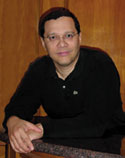
SPRING 2003
TRENDSETTERS
The Gamer’s Angel
 In 1997, an investment
banker set out to convince the world that he could upgrade
cyberathletic competition to the level of a professional
sport. Skeptical investors, and even gamers, snickered at his
vision. Today, Angel Muñoz is founder and president of the
Cyberathlete Professional League (CPL), a multimillion-dollar
computer gaming empire that now includes 300,000 cyberathletes
in 30 countries, annually awards more than $400,000 in prize
money, and has attracted such sponsors as Intel, Microsoft,
Logitech, and ViewSonic.
In 1997, an investment
banker set out to convince the world that he could upgrade
cyberathletic competition to the level of a professional
sport. Skeptical investors, and even gamers, snickered at his
vision. Today, Angel Muñoz is founder and president of the
Cyberathlete Professional League (CPL), a multimillion-dollar
computer gaming empire that now includes 300,000 cyberathletes
in 30 countries, annually awards more than $400,000 in prize
money, and has attracted such sponsors as Intel, Microsoft,
Logitech, and ViewSonic.
Its showpiece event, the CPL
championship, attracted more than 2,000 players last year, and
this summer, the winning team will take home $60,000.
So, how did he push past the skeptics and snickers?
"With tenacity," says the 42-year-old father of two. "I tend
to be tenaciously stubborn, and it was tough for me to accept
defeat." But he couldn’t have done it alone, he says,
remembering the quote from Spanish philosopher Miguel de
Unamuno he has treasured since high school: "Un hombre es él y
sus circunstancias." (A man is himself and his circumstances).
"I surrounded myself with people who believed in the
concept and were as enthusiastic or more so than I was," he
says. "They were willing to put in the hard work and even
risked their financial stability in the process." These
factors alone, however, did not account for his remarkable
success. "Our timing was perfect," Muñoz recalls. In 1997, he
explains, there was enough of a demand from people to compete
in computer games, but there was also a limited number of
gamers. "This allowed us several years to perfect our systems;
it was practice time," he adds, so that by the time the
industry’s expectations and popularity had risen, CPL was
ready.
And, he says, the state of the industry has complied.
"It has grown so dramatically, especially in the last three to
four years." Sales of video games and related gear are
predicted to top $31 billion in sales this year.
Along the way, Muñoz adds, he was not content with
simply ignoring the cynics; he wanted to convince them that he
was right. "The industry is fairly small," he says, "so you
can’t turn your back on it." Instead, Muñoz made sure to
publicly announce any and all company milestones. "We didn’t
always hit our projections," he admits, "but when he did, we
made a big deal about it." What’s next? "To attract people not
necessarily involved in gaming, including casual gamers, and
even viewers," says Muñoz. "To get away from the niche market
toward a broad audience."
"The competitions are not at all what people
imagine," he says. "It’s loud, with a lot of communication
between team managers, coaches and players. They’re very
engaging, and highly emotional," Muñoz affirms, "especially
when the winning team takes home 60 grand."
– Isis Artze